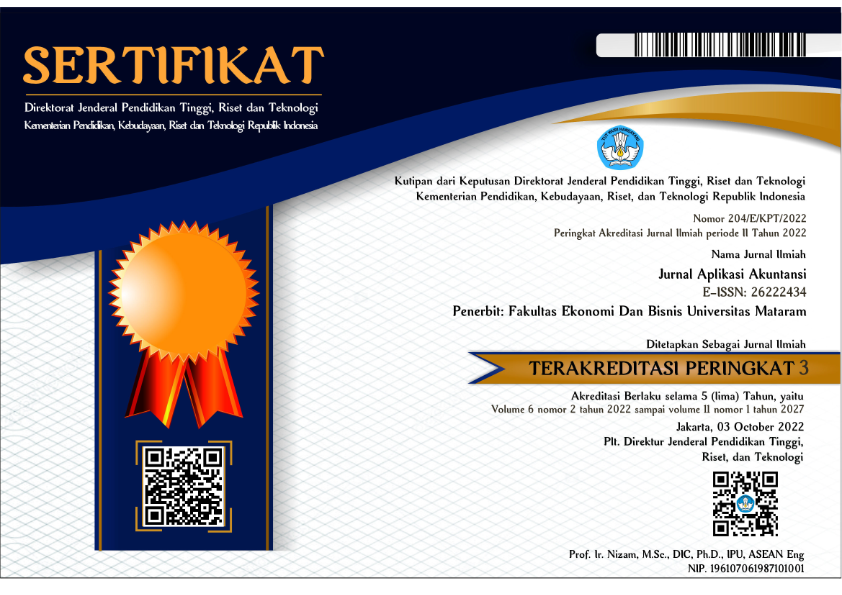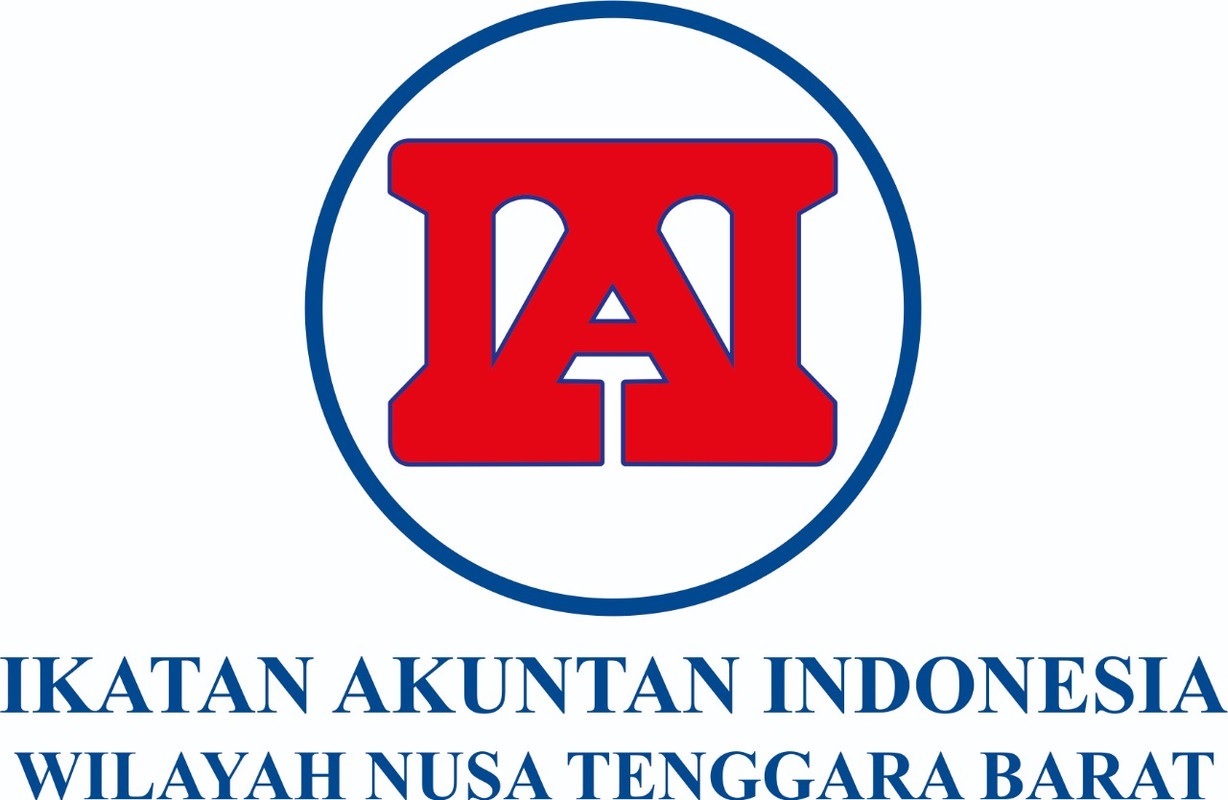DETERMINANTS OF TAX AVOIDANCE IN LQ45 COMPANIES WITH COMPANY SIZE AS A MODERATION
DOI:
https://doi.org/10.29303/jaa.v9i1.430Keywords:
Asset Turnover, Financial Distress, Firm Value, Pofitability, Tax AvoidanceAbstract
This research investigates the determinants of tax avoidance with company size as a moderation. Regarding the increase in environmental social governance (ESG) investment since 2013 in Indonesia, this research uses eight LQ45 companies for 2013-2023. This research uses Moderated Regression Analysis. The results show that profitability, financial distress, and asset turnover significantly influence tax avoidance. In contrast, company size and ESG do not influence tax avoidance. Although company size can moderate profitability on tax avoidance, it cannot moderate financial distress, asset turnover, and ESG on tax avoidance. This research contributes to expanding understanding regarding tax avoidance through agency theory and legitimacy in providing academic literature. This research implies that a company's financial performance can reduce tax avoidance efforts in line with fulfilling stakeholder (principal) expectations regarding increasing profits.
References
Altman, E. I., Haldeman, R., & Narayanan, P. (1977). Zeta Analysis: A New Model to Identify Bankruptcy Risk of Corporations. Journal of Banking & Finance, 1, 1–54.
Amiah, N. (2022). Profitabilitas, Intensitas Modal Dan Penghindaran Pajak : Ukuran Perusahaan Sebagai Variabel Pemoderasi. LITERA: Jurnal Literasi Akuntansi, 2(1), 63–73. https://doi.org/10.55587/jla.v2i1.13
Amri, M. C., & Aryani, Y. A. (2021). Empirical Evidence Of Financial Distress In Indonesia. Assets: Jurnal Akuntansi Dan Pendidikan, 10(2), 165–179. https://doi.org/10.25273/jap.v10i2.8982
Andini, R., Andika, A. D., & Pranaditya, A. (2021). Analisa Pengaruh Kepemilikan Institusional, Proporsi Dewan Komisaris Independen, dan Profitabilitas Terhadap Penghindaran Pajak Dengan Ukuran Perusahaan Sebagai Variabel Moderating (Studi Empiris Pada Industri Barang Konsumsi yang Terdaftar di Bursa Efek Indonesia Tahun 2015-2019). Jurnal Akuntansi Dan Pajak, 22(2), 530–538. https://doi.org/10.29040/jap.v22i2.3193
Anggraini, P., & Wahyudi, I. (2022). Pengaruh Reputasi Perusahaan, Environmental, Social and Governance dan Kualitas Audit Terhadap Tax Avoidance. Jurnal Ilmiah Akuntansi Dan Keuangan, 5(2), 643–649. https://doi.org/10.32670/fairvalue.v5i2.2120
Ariska, M., Fahru, M., & Kusuma, J. W. (2020). Leverage, Ukuran Perusahaan dan Profitabilitas dan Pengaruhnya Terhadap Tax Avoidance Pada Perusahaan Sektor Pertambangan di Bursa Efek Indonesia Tahun 2014-2019. Jurnal Revenue, 01(01), 133–142. https://doi.org/10.46306/rev.v1i1
Barli, H. (2018). Pengaruh Leverage dan Firm Size Terhadap Penghindaran Pajak (Studi Empiris pada Perusahaan sektor Property, Real Estate dan Building Construction yang Terdaftar di Bursa Efek Indonesia Periode Tahun 2013-2017). Jurnal Ilmiah Akuntansi Universitas Pamulang, 6(2), 223–238.
Basri, Y. M., Waluyo, T. M., & Rusli. (2014). Determinant of Tax Avoidance on Manufacturing Companies. The Indonesian Journal Of Accounting Research, 17(1), 35–56. https://doi.org/10.33312/ijar.357
Dewinta, I., & Setiawan, P. (2016). Pengaruh Ukuran Perusahaan, Umur Perusahaan, Profitabilitas, Leverage, dan Pertumbuhan Penjualan. E-Jurnal Akuntansi Universitas Udayana, 14(3), 1584–1613.
Dowling, J., & Pfeffer, J. (1975). Organizational Legitimacy: Social Values and Organizational Behavior. The Pacific Sociological Review, 18(1), 122–136. https://doi.org/10.2307/1388226
Dyreng, S. D., Hanlon, M., & Maydew, E. L. (2008). Long-Run Corporate Tax Avoidance. The Accounting Review, 83(1), 61–82. https://doi.org/10.2308/accr.2008.83.1.61
Ernandi, H., & Rizal Afandi, F. (2016). Pengaruh Struktur Corporate Governance, Leverage, dan Return on Assets Perusahaan Terhadap Tax Avoidance. Balance, 13(2), 1–14. https://doi.org/10.30651/blc.v13i02.1327
Fadhila, N., & Andayani, S. (2022). Pengaruh Financial Distress, Profitabilitas, dan Leverage terhadap Tax Avoidance. Owner, 6(4), 3489–3500. https://doi.org/10.33395/owner.v6i4.1211
Faradisty, A., Hariyani, E., & Wiguna, M. (2019). The Effect of Corporate Social Responsibility, Profitability, Independent Commissioners, Sales Growth and Capital Intensity on Tax Avoidance. Journal of Contemporary Accounting, 1(3), 153–160. https://doi.org/10.20885/jca.vol1.iss3.art3
Fitria, G., & Taufik, A. (2020). Tax Avoidance Level: Executive Characteristic, Independent Commissioner and Profitability in Indonesia Manufacture Company. European Union Digital Library, 1–11. https://doi.org/10.4108/eai.26-3-2019.2290694
Fitriani, R. A., & Indrati, M. (2023). The Influence of Capital Intensity, Inventory Intensity, and Profitability on Tax Aggressiveness with Debt Levels as a Moderating Variable. Ilomata International Journal of Tax & Accounting, 4(2), 145–163. https://doi.org/10.52728/ijtc.v4i1.678
Gayatri, A. A. A. N., & Damayanthi, I. G. A. E. (2024). Ukuran Perusahaan, Intensitas Modal, Financial Distress, dan Penghindaran Pajak. E-Jurnal Akuntansi, 34(2), 511–522. https://doi.org/10.24843/EJA.2024.v34.i02.p17
Gesso, C. Del, & Lodhi, R. N. (2024). Theories Underlying Environmental, Social and Governance (ESG) Disclosure: A Systematic Review of Accounting Studies. Journal of Accounting Literature. https://doi.org/10.1108/jal-08-2023-0143
IDX. (2021). Indeks Saham. https://www.idx.co.id/id/produk/indeks
Ismiani, A., & Mahpudin, E. (2020). Pengaruh Profitabilitas, Leverage, dan Ukuran Perusahaan Terhadap Tax Avoidance. AKUNTABEL, 17(2), 2020–2289. https://doi.org/10.30872/jakt.v17i2.7981
Jemiolo, S., & Farnsel, C. (2023). Complements, Substitutes or Neither? A Review of the Relation Between Corporate Social Responsibility and Corporate Tax Avoidance. Journal of Accounting Literature, 45(3), 474–496. https://doi.org/10.1108/jal-12-2021-0018
Jensen, M. C., & Meckling, W. H. (1976). Theory of the Firm: Managerial Behavior, Agency Costs and Ownership Structure. Journal of Financial Economics, 3(4), 305–360. https://doi.org/10.1016/0304-405X(76)90026-X
Julianty, I., Agung Ulupui, I. G. K., & Nasution, H. (2023). Pengaruh Financial Distress dan Capital Intensity Terhadap tax Avoidance Dengan Ukuran Perusahaan Sebagai Pemoderasi. Jurnal Informasi, Perpajakan, Akuntansi, Dan Keuangan Publik, 18(2), 257–280. https://doi.org/10.25105/jipak.v18i2.17171
Kamayanti, A., Qomariyah, N., Muwidha, M., & Ernawati, W. D. (2023). The Significance of Financial Distress on Tax Avoidance Compared to Gender Diversity and Social Responsibility: A Study from Indonesia. Management and Accounting Review, 22(2), 401–419. https://doi.org/10.24191/MAR.V22i02-16
Kim, J., & Im, C. (2017). Study on Corporate Social Responsibility (CSR): Focus on Tax Avoidance and Financial Ratio Analysis. Sustainability (Switzerland), 9(10), 1–15. https://doi.org/10.3390/su9101710
KPMG Internasional. (2013). The KPMG Survey of Corporate Responsibility Reporting 2013. https://assets.kpmg.com/content/dam/kpmg/pdf/2013/12/corporate-responsibility-reporting-survey-2013.pdf
Kusumadani, H., & Rahayuningsih, D. A. (2023). Apakah Karakteristik Perusahaan dan Atribut Audit Memengaruhi Tax Avoidance? Jurnal Studi Akuntansi Dan Keuangan, 6(1), 55–72. https://doi.org/10.29303/akurasi.v6i1.332
Listyarini, F. (2020). Analisis Perbandingan Prediksi Kondisi Financial Distress Dengan Menggunakan Model Altman, Springate, dan Zmijewski. Jurnal Bina Akuntansi, 7(1), 1–20. https://doi.org/10.52859/jba.v7i1.71
Maharani, I. G. A. C., & Suardana, K. A. (2014). Pengaruh Corporate Governance, Profitabilitas dan Karakteristik Eksekutif pada Tax Avoidance Perusahaan Manufaktur. E-Jurnal Akuntansi Universitas Udayana, 9(2), 525–539.
Marsahala, Y. T., Arieftiara, D., & Lastiningsih, N. (2020). Profitability, Capital Intensity and Tax Avoidance in Indonesia: The Effect Board of Commissioners' Competencies. Journal of Contemporary Accounting, 2(3), 129–140. https://doi.org/10.20885/jca.vol2.iss3.art2
Maulida, F., Hasanah, N., & Sariwulan, T. (2023). Pengaruh Likuiditas Dan Financial Distress Terhadap Agresivitas Pajak Dengan Firm Size Sebagai Variabel Moderasi Pada Perusahaan Badan Usaha Milik Negara Yang Terdaftar Di Bursa Efek Indonesia Tahun 2018-2020. Jurnal Ilmiah Wahana Akuntansi, 18(1), 17–35. https://doi.org/10.21009/wahana.18.012
Mukhtaruddin, Susanto, H., Rahmah, S. M., Saftiana, Y., & Kalsum, U. (2024). Tax Avoidance Practices: Effect of Environmental, Social, and Governance, Earning Management, and Company Size as Moderating Variable (Study on LQ45 Companies Listed in Indonesia Stock Exchange). Asian Economic and Financial Review, 14(2), 127–142. https://doi.org/10.55493/5002.v14i2.5010
Novriyanti, I., & Dalam, W. W. W. (2020). Faktor-Faktor yang Mempengaruhi Penghindaran Pajak. Journal of Applied Accounting and Taxation, 5(1), 24–35. https://doi.org/10.30871/jaat.v5i1.1862
Nyman, R., Kaidun, I. P., & Lingga, I. S. (2022). Pengaruh Firm Size, Return On Equity, dan Current Ratio Terhadap Tax Avoidance pada Perusahaan LQ 45 yang Terdaftar di Bursa Efek Indonesia. Jurnal Akuntansi, 14(1), 172–186. https://doi.org/10.28932/jam.v14i1.4375
Oktaviani, V., Fatonah, S., & Meilisa, R. (2020). Analisis Kinerja Keuangan Menggunakan Current Ratio (CR), Return on Asset (ROA) dan Debt to Asset Ratio (DAR) Pada PT Golden Plantation Tbk Periode 2014-2018. Jurnal Bina Bangsa Ekonomika, 13(2), 295–300. https://doi.org/10.46306/jbbe.v13i2
Patin, J.-C., Rahman, M., & Mustafa, M. (2020). Impact of Total asset Turnover Ratios on Equity Returns: Dynamic Panel Data Analyses. Journal of Accounting, Business and Management (JABM, 27(1), 19–29. https://doi.org/10.31966/jabminternational.v27i1.559
Pratiwi, N. I., Fuadah, L. L., & Yunisvita. (2024). The Influence Of Environmental, Social, And Governance (ESG) And Capital Intensity On Tax Avoidance In Public Companies Listed On The Indonesian Stock Exchange (IDX). Management Studies and Entrepreneurship Journal, 5(2), 7772–7783. https://doi.org/10.37385/msej.v5i2.5494
Purwitha, I. bagus S. (2022). Reaksi Pasar Atas Pengumuman Buyback Saham Pada Saaat Pandemi COVID-19 Di Bursa Efek Indonesia. E-Jurnal Ekonomi Dan Bisnis Universitas Udayana, 11(8), 969–978. https://ojs.unud.ac.id/index.php/EEB/index
Rachmad, Y., A, N., & Yusmita, F. (2023). What Motivates Companies to Avoid Tax? Jurnal Aset (Akuntansi Riset), 15(1), 89–98. https://doi.org/10.17509/jaset.v15i1
Rahma, R. A., & Firmansyah, A. (2022). Does Independent Commissioner Have a Role in the Relationship Between Sustainability Disclosure, Debt Policy, and Tax Avoidance? Journal of Contemporary Accounting, 4(2), 65–79. https://doi.org/10.20885/jca.vol4.iss2.art1
Rahmadani, Muda, I., & Abubakar, E. (2020). Pengaruh Ukuran Perusahaan, Profitabilitas, Leverage, dan Manajemen Laba terhadap Penghindaran Pajak Dimoderasi oleh Political Connection. Jurnal Riset Akuntansi Dan Keuangan, 8(2), 375–392. https://doi.org/10.17509/jrak.v8i2.22807
Rahmawati, D., & Nani, D. A. (2021). Pengaruh Profitabilitas, Ukuran Perusahaan, dan Tingkat Hutang Terhadap Tax Avoidance. Jurnal Akuntansi Dan Keuangan, 26(1), 1–11. https://doi.org/10.23960/jak.v26i1.246
Ramadani, S., & Tanno, A. (2022). Pengaruh Profitabilitas, Leverage, dan Capital Intensity terhadap Penghindaran Pajak Dengan Ukuran Perusahaan Sebagai Variabel Moderasi. Syntax Literate: Jurnal Ilmiah Indonesia, 7(12), 19975–19994. https://doi.org/10.36418/syntax-literate.v7i12.11617
Rifai, A., & Atiningsih, S. (2019). Pengaruh Leverage, Profitabilitas, Capital Intensity, Manajemen Laba Terhadap Penghindaran Pajak. Journal of Economic and Banking, 1(2), 135–142. https://doi.org/10.35829/econbank.v1i2.175
Riskatari, N. K. R., & Jati, I. K. (2020). Pengaruh Profitabilitas, Leverage dan Ukuran Perusahaan pada Tax Avoidance. E-Jurnal Akuntansi, 30(4), 886–896. https://doi.org/10.24843/eja.2020.v30.i04.p07
Rista, N., Aprilina, V., & Baryanto, S. (2022). E-Commerce, Self Assessment System, Tax Knowledge and Automatic Exchange of Information on Tax Avoidance Intentions. Journal Ilmiah Manajemen Dan Bisnis, 8(2), 191–202. https://doi.org/10.22441/jimb.v8i2
Robin, Anggara, J., Tandrean, R., & Afiezan, H. A. (2021). Pengaruh Ukuran Perusahaan, Profitabilitas, Leverage, dan Pertumbuhan Penjualan Terhadap Penghindaran Pajak/Tax Avoidance. Jurnal Ilmiah MEA (Manajemen, Ekonomi, Dan Akuntansi), 5(2), 1232–1246. https://doi.org/10.31955/mea.v5i2.1285
Safitri, E., & Arifin, A. (2024). Pengaruh Kepemilikan Institusional, Komisaris Independen, Financial Distress terhadap Tax Avoidance dengan Ukuran Perusahaan sebagai Variabel Moderasi (Studi Kasus pada Perusahaan Makanan dan Minuman yang Terdaftar di Bursa Efek Indonesia Tahun 2020-2022). Economics and Digital Business Review, 5(1), 340–357. https://doi.org/10.37531/ecotal.v5i1.1006
Sanjaya, S., & Sipahutar, R. P. (2019). Pengaruh Current Ratio, Debt to Asset Ratio dan Total Asset Turnover terhadap Return on Asset pada Perusahaan Otomotif dan Komponennya yang Terdaftar di Bursa Efek Indonesia. Jurnal Riset Akuntansi Dan Bisnis, 19(2), 136–150. https://doi.org/10.30596/jrab.v19i2.4599
Satria, F., Bukit, R., & Bestari. (2021). Analisis Faktor Determinan Fundamental Tax Avoidance Dengan Committee Ratio Sebagai Variable Moderating. Journal of Accounting and Management Innovation, 5(2), 106–122. https://doi.org/10.19166/%25JAMI%256%252%252022%25
Sinamo, C. B., & Fatimah, H. (2022). Analisis Pengaruh Ukuran Perusahaan, Pertumbuhan Penjualan, Leverage, dan Total Assset Turnover terhadap Penghindaran Pajak di Perusahaan Sektor Barang Konsumen Primer Tahun 2017-2020. Prosiding SNAM PNJ.
Sitorus, F. D., Christiadi, R., Silalahi, B. R. br., Shelly, & Laia, D. (2022). Pengaruh Struktur Aktiva, Perputaran Total Asset, Perputaran Aktiva Tetap, dan Laverage Terhadap Profitabilitas (ROA). Owner: Riset Dan Jurnal Akuntansi, 6(1), 247–258. https://doi.org/10.33395/owner.v6i1.563
Sodikin, Moh., Aminatuzzuhro, & Rodhiyah. (2024). The Influence of Corporate Reputation, Available Slack, Company Size, and Leverage on Tax Avoidance. Accounting and Finance Studies, 4(2), 071–087. https://doi.org/10.47153/afs42.9242024
Sugimin, Indarto, & Induwi, D. (2024). Do Environmental, Social, and Governance (ESG), Leverage, and Financial Performance Affect Tax Avoidance? Jurnal Konsep Bisnis Dan Manajemen), 10(2), 209–222. https://doi.org/10.31289/jkbm.v10i2.11732
Supardi, H., Suratno, H., & Suyanto. (2016). Pengaruh Current Tatio, Debt To Asset Ratio, Total Asset Turnover dan Inflasi Terhadap Return On Asset. Jurnal Ilmiah Akuntansi Fakultas Ekonomi, 2(2), 16–27. https://doi.org/10.34204/jiafe.v2i2.541
Suripto, & Novitaria. (2021). Influence of Tunneling Incentive, Risk Management and Company Characteristics on Tax Avoidance with Corporate Social Responsibility Disclosure Asa Moderating Variable In Mining Companies Listed on IDX. International Journal of Social Science and Business, 5(4), 498–506. https://doi.org/10.23887/ijssb.v5i4.36981
Susanto, L., Yanti, & Viriany. (2018). Faktor-Faktor Yang Mempengaruhi Agresivitas Pajak. Jurnal Ekonomi, 23(1), 10–19. https://doi.org/10.24912/je.v23i1.330
Suyanto, Apriliyana, S., Alfiani, H., & Putri, F. K. (2022). Harga Transfer, Kesulitan Keuangan, Manajemen Laba, dan Penghindaran Pajak: Ukuran Perusahaan sebagai Pemoderasi. Akuntansi Dewantara, 6(3), 88–101. https://doi.org/10.30738/ad.v6i3.13327
Widianti, F. D. A., & Prasetyo, A. B. (2023). Do Corporate Social Responsibility and Corporate Governance Disclosures Affect Tax Avoidance? Accounting Analysis Journal, 12(3), 165–176. https://doi.org/10.15294/aaj.v12i3.70867
Windaryani, I. G. A. I., & Jati, I. K. (2020). Pengaruh Ukuran Perusahaan, Kepemilikan Institusional, dan Konservatisme Akuntansi pada Tax Avoidance. E-Jurnal Akuntansi, 30(2), 375. https://doi.org/10.24843/eja.2020.v30.i02.p08
Yoon, B. H., Lee, J. H., & Cho, J. H. (2021). The Effect of ESG Performance on Tax Avoidance - Evidence From Korea. Sustainability (Switzerland), 13(12). https://doi.org/10.3390/su13126729
Yuliana, D., Susanti, S., & Zulaihati, S. (2021). Pengaruh Financial Distress dan Corporate Governance Terhadap tax Avoidance. Jurnal Akuntansi, Perpajakan Dan Auditing, 2(2), 435–451.
Yunus, M. I. D., Fala, D. Y. A. S., & Hormati, A. (2024). Pengaruh Financial Distress, Political Connection, Foreign Activity, dan Audit Committee Terhadap Tax Avoidance. Bongaya Journal of Research in Accounting, 7(1), 80–88. https://doi.org/10.37888/bjra.v7i1.508
Downloads
Published
How to Cite
Issue
Section
License
Copyright (c) 2024 Farradesty Cahyaning Tyas, Nina Febriana Dosinta, Juanda Astarani

This work is licensed under a Creative Commons Attribution-NonCommercial-ShareAlike 4.0 International License.









